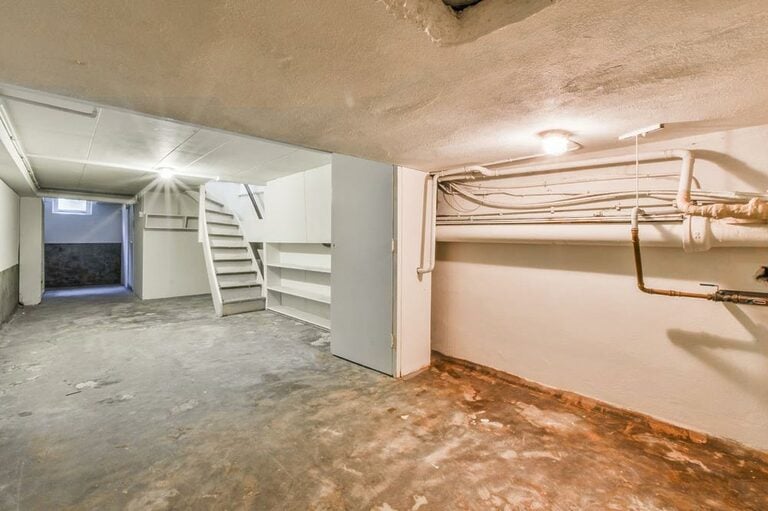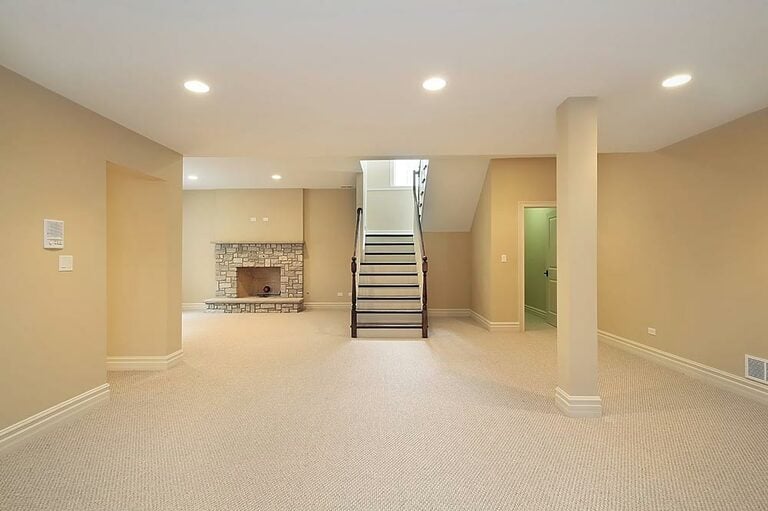If you are a homeowner or in the market to purchase a home, you are likely familiar with finished and unfinished basements. Whether or not your basement is finished plays a big role in how you can use it on a daily basis.
While some people are satisfied with an unfinished basement, other people recognize the benefits of taking time to finish their basements. In this article, we’ll outline the main pros and cons of these two types of basements so that you can decide which one is preferable for your home.
Advantages of an Unfinished Basement
By nature, an unfinished basement is far less refined than a finished one. These spaces often have minimal aesthetic appeal and often include exposed concrete and support beams. However, these spaces are not necessarily the most attractive feature of your home, they still have plenty of use.
A basement that’s not finished can be the ideal location for serving functional uses in ways other areas of your home cannot. For instance, an unfinished basement is often an excellent space for storing your personal belongings. In addition, they provide a great space for laundry machines, home fueling systems, and other useful appliances.

A home without a fully finished can also be an advantageous option for prospective home buyers on a budget. Because these basements lack the amenities that finished basements provide, homes with unfinished basements are often slightly less expensive.
Disadvantages of an Unfinished Basement
While unfinished basements have plenty of uses, these spaces come with some disadvantages as well. The most noticeable of these is the fact that they can be a bit of an eyesore since they lack the features and materials that typically allow an indoor space to appear inviting and relaxing.
Additionally, this basement style does not provide any additional living space because they do not come equipped with any amenities that would support that use. Since unfinished basements are not living spaces, they often don’t get the same amount of attention and maintenance as the other areas of your home.
The lack of attention and maintenance that unfinished basements tend to receive can cause them to degrade unnoticed over time. This eventually requires you to spend more on basement repairs than you do for repairs on other areas of your home.
What Makes a Basement Finished?
While the sections above describe the main advantages and disadvantages of unfinished basements, the decision of whether or not to finish your basement remains up to you. Before you can make that decision, however, it is important to first understand what elements make a basement officially finished. Nearly all finished basements include the following features:
- Finished walls and flooring
- Electricity
- Heat
- Waterproofing
- Functional and easy-to-access entrance(s)
- Wall materials

Ultimately, finishing a basement means turning it into a space that is as livable as any other room in your house. The items in the list above are necessary for achieving that goal, but there are plenty of other features and elements you can add to your finished basements once you’ve covered the essentials.
Changing Your Basement from Unfinished to Finished
If you are an owner of an unfinished basement and are convinced that finishing it is the right approach, the next step is to learn more about how to complete this substantial project. In most cases, finishing a basement is not something you can do on your own. Instead, you’ll need to seek the help of a professional with the right technical expertise to finish your basement correctly.
One of the best first steps you can take when finishing your basement is to hire a foundation team to evaluate its condition. After all, if your foundation is in need of repair, it is better to perform them before installing finished flooring, walls, and other finished basement features.
At this stage, you may also find that your basement could benefit from a waterproofing service. Since basements that are not finished don’t serve as lived-in spaces, many of them lack waterproofing, which can lead to significant damage. Waterproofing your basement during the early stages of this process will help protect your finished basement once it is complete.
After ensuring that your foundation is intact and has dependable waterproofing, you can proceed to install all of the required elements of a finished basement we mentioned in the previous section. Once that’s done, you will have successfully increased the living space in your home and created an area that you and your family can truly enjoy.
Get Help Finishing Your Basement
While unfinished basements are certainly satisfactory to many homeowners, they come with both pros and cons as well. Mainly, unfinished basements are functional spaces that are great for storage and laundry, but not much else. They also tend to be somewhat unattractive and may have a greater need for repairs.
Again, choosing to finish your basement is entirely up to you–but if you choose this route, it is always best to hire a professional to help you throughout the basement finishing process.
During the early stages of that process, you’ll need to consult a foundation expert to determine whether your basement needs repairs and provide any necessary foundation services, such as waterproofing.
If you live in Eastern North Carolina and want to evaluate the state of your foundation before completing your unfinished basement, the team at Regional Foundation & Crawl Space Repair is here to help. We have extensive experience with foundation repair and waterproofing, among many other services. If you want to learn more, take advantage of our free estimate offer today!

